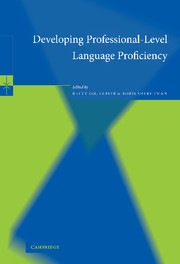Book contents
- Frontmatter
- Contents
- Notes on contributors
- Foreword
- Acknowledgments
- I Principles, practices, and theory
- II Programs
- 3 Contexts for advanced foreign language learning: a report on an immersion institute
- 4 Bridging the gap between language for general purposes and language for work: an intensive Superior-level language/skill course for teachers, translators, and interpreters
- 5 Learning Chinese in China: programs for developing Superior- to Distinguished-level Chinese language proficiency in China and Taiwan
- 6 Developing professional-level oral proficiency: the Shekhtman Method of Communicative teaching
- 7 The LangNet “Reading to the Four” Project: applied technology at higher levels of language learning
- 8 In the quest for the Level 4+ in Arabic: training Level 2–3 learners in independent reading
- 9 Teaching high-level writing skills in English at a Danish university
- 10 Heritage speakers as learners at the Superior level: differences and similarities between Spanish and Russian student populations
- 11 Teaching Russian language teachers in eight summer Institutes in Russian language and culture
- III Learners and users
- References
- Index
9 - Teaching high-level writing skills in English at a Danish university
Published online by Cambridge University Press: 03 December 2009
- Frontmatter
- Contents
- Notes on contributors
- Foreword
- Acknowledgments
- I Principles, practices, and theory
- II Programs
- 3 Contexts for advanced foreign language learning: a report on an immersion institute
- 4 Bridging the gap between language for general purposes and language for work: an intensive Superior-level language/skill course for teachers, translators, and interpreters
- 5 Learning Chinese in China: programs for developing Superior- to Distinguished-level Chinese language proficiency in China and Taiwan
- 6 Developing professional-level oral proficiency: the Shekhtman Method of Communicative teaching
- 7 The LangNet “Reading to the Four” Project: applied technology at higher levels of language learning
- 8 In the quest for the Level 4+ in Arabic: training Level 2–3 learners in independent reading
- 9 Teaching high-level writing skills in English at a Danish university
- 10 Heritage speakers as learners at the Superior level: differences and similarities between Spanish and Russian student populations
- 11 Teaching Russian language teachers in eight summer Institutes in Russian language and culture
- III Learners and users
- References
- Index
Summary
I do not believe that there can be any “quick fix” or magic formula for making students Distinguished-level writers in a foreign language. There is simply too much to learn. However, I do believe that developing an awareness of variety of voice, of different generic conventions, of the way that audience and purpose can dramatically shape text in different ways, is an area where many writers can make a major and necessary step. Activities can easily be devised to develop this awareness, and this chapter briefly describes a variety of these. Acquiring the language range necessary to transfer the benefits of awareness into greatly improved writing is likely to be a longer process, but one where even the smallest increment helps. If students are asked to tackle a variety of tasks which differ from those of “conventional” essay/self-expression writing courses, these should create a clear need for, and provide opportunities for teaching, language that will increase students' range.
This chapter describes the rationale behind a course taught at the English Department of the University of Aarhus, Denmark, and gives examples of activities used in the teaching. The course covers a variety of aspects of English in use but focuses particularly on written English and on writing skills in a nonliterary context. One aim of the course is to help students over time to improve their own writing proficiency to a truly Superior or Distinguished level.
- Type
- Chapter
- Information
- Developing Professional-Level Language Proficiency , pp. 177 - 196Publisher: Cambridge University PressPrint publication year: 2002
- 1
- Cited by



